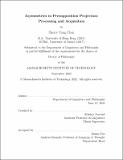Asymmetries in Presupposition Projection: Processing and Acquisition
Author(s)
Chen, Sherry Yong
DownloadThesis PDF (5.154Mb)
Advisor
Aravind, Athulya
Terms of use
Metadata
Show full item recordAbstract
In this dissertation, I aim to provide novel evidence to shed light on the projection problem of presuppositions. The focus is on identifying the underlying patterns of how presuppositions project out of two binary connectives, if and or, by disentangling semantic presuppositions from additional processes. A series of behavioral experiments examine how English-speaking adults process presuppositional sentences in real time, and what children in the preschool age range know about presupposition projection in these constructions, finding a host of evidence in favor of a family of theories that take an asymmetric view of presupposition projection.
The dissertation is organized into three main parts. The first part focuses on the processing of presupposition projection in adults. The real-time processing of presupposition projection out of binary connectives shows an asymmetric pattern, as reflected by response time latencies associated with the left argument compared to the right argument. The second part investigates preschool-aged children’s knowledge of presupposition projection out of if -conditionals and disjunctions. Results reveal that at the age of 5, children’s behaviors reveal an environment-based asymmetry, much like what we observed in adults’ processing signature: when the embedded presupposition from the antecedent environment is not globally satisfied, it received much lower endorsement rates, compared to the consequent environment. 6-yearolds have an even more sophisticated command of presupposition projection out of if-conditionals, in that they can also recruit presupposition-cancelling mechanisms so as to avoid presupposition failure in a nearly adult-like manner. The third part of the dissertation is on presupposition strengthening. The experimental results in the previous two chapters suggest that there is substantial evidence pointing toward the asymmetric view of presupposition projection across two binary connectives. But the asymmetric view crucially predicts a conditionalized presupposition for the right argument, which is sometimes too weak. I defend the notion of pragmatic strengthening by addressing a challenge posed by Mandelkern (2016a, 2016b), where the classic notions of pragmatic strengthening do not appear to be applicable, yet a stronger, non-conditional presupposition arises contrary to the asymmetric view’s predictions. Building on crucial insights from Fox (2019), I present an idea arguing that this non-conditional presupposition does not in fact directly come from presupposition projection out of the conditional assertion, but is the presupposition of an accommodated question that is salient in the context. The question-based explanation can supplement the asymmetric theories, thereby removing the motivation to opt for an alternative theory that treats the non-conditional presupposition p as the basic one.
Ultimately, I defend an asymmetric view of presupposition projection, as advocated by Satisfaction Theory and Trivalent Logics. The experimental findings provide novel empirical support that corroborates the predictions of these theories: for presuppositions projected out of binary connectives, the basic, semantic pattern of projection is asymmetric in nature, with a stronger presupposition projected from the left argument than the right argument. These findings together with a better understanding of the general pragmatic principles that affect discourse structure, provide further empirical and theoretical challenges that will need to be addressed by opposing theories.
Date issued
2022-09Department
Massachusetts Institute of Technology. Department of Linguistics and PhilosophyPublisher
Massachusetts Institute of Technology